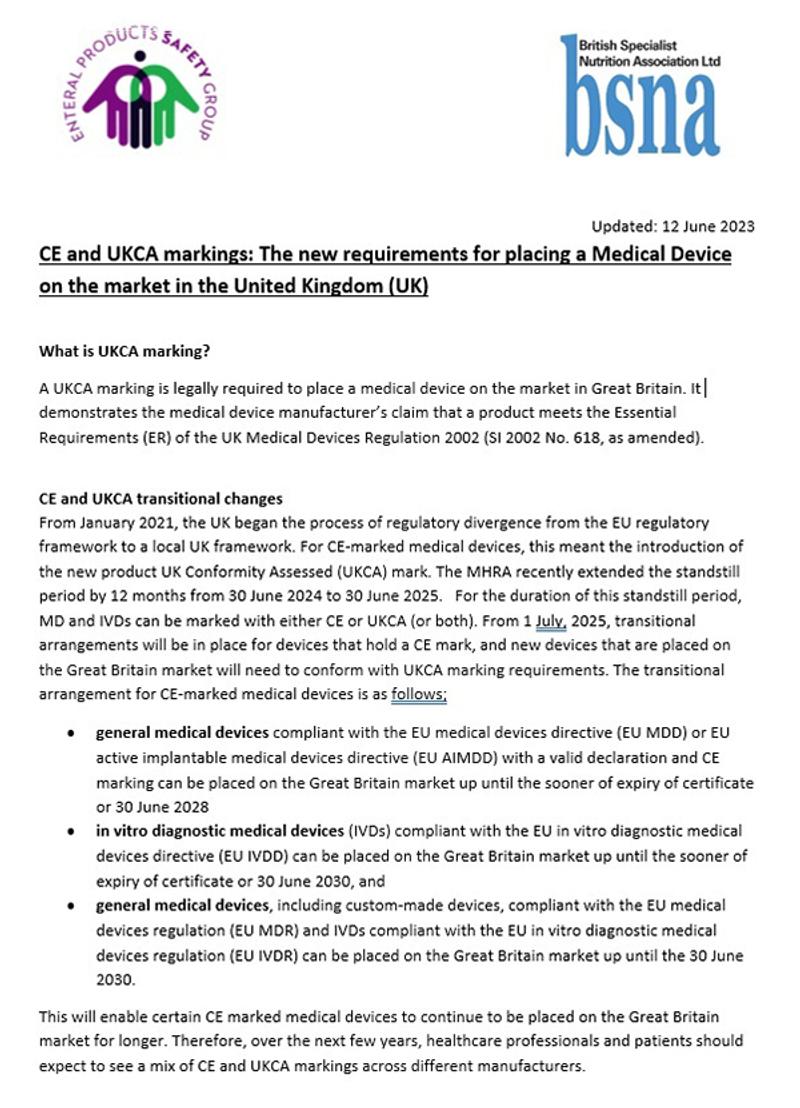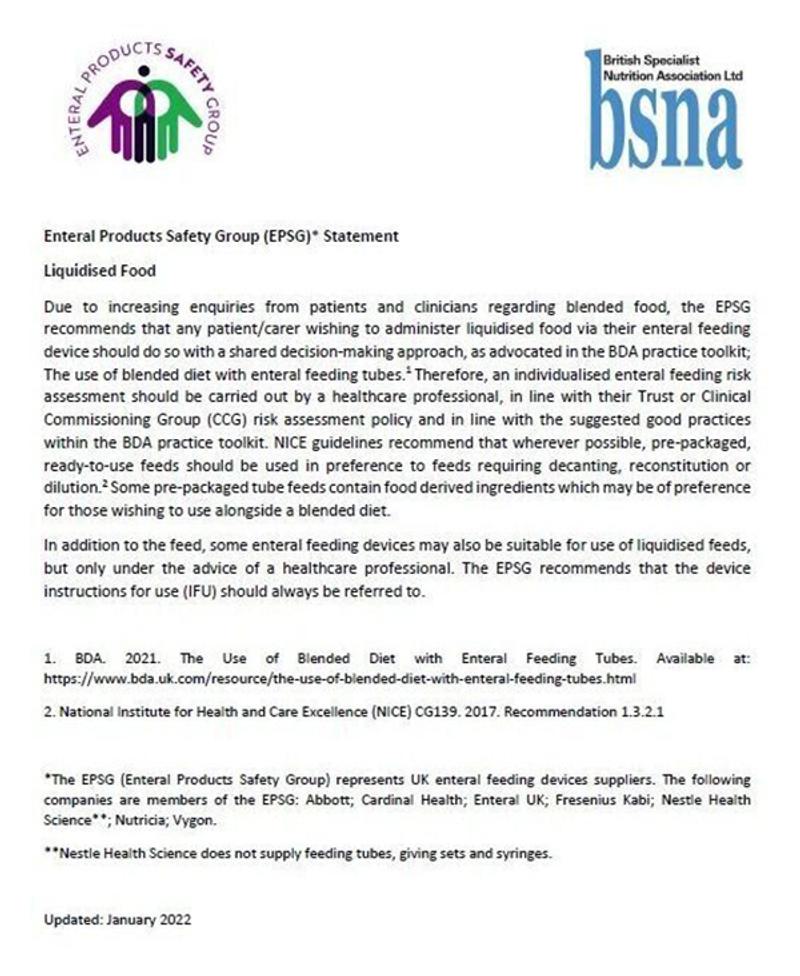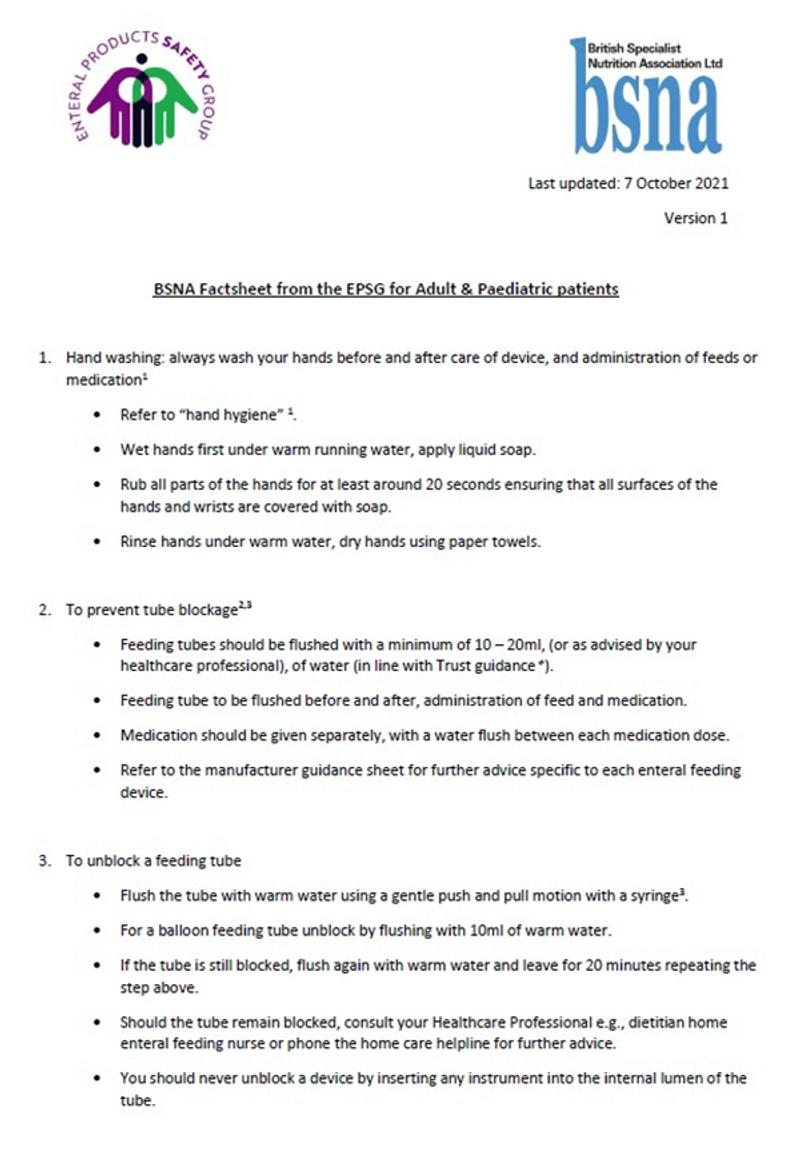What is the EPSG (Enteral Products Safety Group)?
The EPSG (Enteral Products Safety Group) is an associate member of BSNA representing the majority of leading UK enteral feeding device suppliers. The EPSG discusses enteral feeding device safety from both a clinical and manufacturing perspective.
Regularly participating in EPSG meetings is the clinical representation from the Parenteral and Enteral Nutrition Group (PENG) of the British Dietetic Association (BDA), National Nurse Nutrition Group (NNNG) and supported by Patients On Intravenous & Nasogastric Nutrition Therapy (PINNT), British Association for Parenteral and Enteral Nutrition (BAPEN) and British Pharmaceutical Nutrition Group (BPNG).
Our vision is to be recognised as the definitive and trusted voice of the enteral products industry committed to improving patient safety and clinical outcomes; and our mission is:
- To represent the enteral products industry
- To ensure that all patients have optimal access to high quality enteral product devices through choice and innovation
- To deliver education and awareness and best practice, including in relation to the environment and sustainability
- To promote collaboration between industry, healthcare professionals, patient groups and their Associations
The term ‘enteral feeding device’ refers to any type of feeding tube that is placed into the gastro-intestinal tract, i.e. nasogastric (NG), nasojejunal (NJ), gastrostomy (Button, PEG/RIG) or jejunostomy (JEJ), as well as giving/extension sets, syringes and enteral feeding pumps.
CE and UKCA marking: The new requirements for placing a Medical Device on the market in the United Kingdom (UK)
BSNA EPSG CE and UKCA markings 20230612 To find out more about the transitional changes taking place to the CE marking on medical device placed on the market in the United Kingdom click here.
Enteral Products Safety Group (EPSG) Statement: Liquidised Food
Updated January 2022
Due to increasing enquiries from patients and clinicians regarding blended food, the EPSG recommends that any patient/carer wishing to administer liquidised food via their enteral feeding device should do so with a shared decision-making approach, as advocated in the BDA practice toolkit; The use of blended diet with enteral feeding tubes.1 Therefore, an individualised enteral feeding risk assessment should be carried out by a healthcare professional, in line with their Trust or Clinical Commissioning Group (CCG) risk assessment policy and in line with the suggested good practices within the BDA practice toolkit. NICE guidelines recommend that wherever possible, pre-packaged, ready-to-use feeds should be used in preference to feeds requiring decanting, reconstitution or dilution.2 Some pre-packaged tube feeds contain food derived ingredients which may be of preference for those wishing to use alongside a blended diet.
In addition to the feed, some enteral feeding devices may also be suitable for use of liquidised feeds, but only under the advice of a healthcare professional. The EPSG recommends that the device instructions for use (IFU) should always be referred to.
1. BDA. 2021. The Use of Blended Diet with Enteral Feeding Tubes. Available at: https://www.bda.uk.com/resourc...
2. National Institute for Health and Care Excellence (NICE) CG139. 2017. Recommendation 1.3.2.1
*The EPSG (Enteral Products Safety Group) represents UK enteral feeding devices suppliers. The following companies are members of the EPSG: Abbott; Cardinal Health; Fresenius Kabi; Nestle Health Science**; Nutricia; Vygon.
**Nestle Health Science does not supply feeding tubes, giving sets and syringes.
The full statement can be downloaded here.
The EPSG recommends that any patient/carer wishing to administer liquidised food via their enteral feeding device should do so with a shared decision-making approach
The full statement can be downloaded here.
For further company specifics please visit the following pages:
BSNA Factsheet from the EPSG for Adult & Paediatric patients
The Enteral Products Safety Group (EPSG) has developed a fact sheet as a general guide to safe care of tubes and their use, including tube blockages, washing syringes, stoma, tube and pump care.
This fact sheet is a general guide, and not intended as a comprehensive training package on all aspects of tube blockages, washing syringes, stoma, tube and pump care.
The full document can be viewed here.










